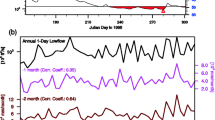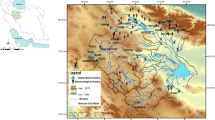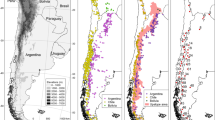Abstract
Winter and summer 7-day low flows of eighteen natural rivers in the St. Lawrence River watershed of Quebec were analyzed over the period from 1934 to 2000. The rivers were first subdivided into three modes using principal component analysis. Two of these modes are located on the south shore of the St. Lawrence River, respectively south (Southeast mode) and north (East mode) of the 47°N, and the third (Southwest mode) is located on the north shore. The Southeast mode shows a significant increase in 7-day low flows in winter and summer due to increasing summer and fall precipitation, whereas the Southwest mode shows a significant decrease in summer 7-day low flows due to an increase in evapotranspiration. No significant change in winter and summer 7-day low flows is observed in the East mode. Results show that the variability of 7-day low flows and their link with climate indices are mainly seasonally dependent. The North Atlantic Oscillation (NAO) is the only index which is correlated to 7-day low flows in all three modes. This correlation is positive for north shore rivers and negative for south shore rivers. Furthermore, only north shore rivers are correlated to NAO in both winter and summer.




Similar content being viewed by others
Explore related subjects
Discover the latest articles and news from researchers in related subjects, suggested using machine learning.References
Alila Y, Kuras PK, Schnorbus M, Hudson R (2009) Forests and floods: a new paradigm sheds light on age-old controversies. Water Resour Res 45:8416
Alila Y, Hudson R, Kuras PK, Schnorbus M, Rasouli K (2010) Reply to comment by Jack Lewis et al. on “Forests and floods: a new paradigm sheds light on age-old controversies”. Water Resour Res 46:W05802. doi:10.1029/2009WR009028
Anctil F, Coulibaly P (2004) Wavelet analysis of the interannual variability in Southern Québec Streamflow. J Clim 17:163–173
Anctil F, Larouche W, Hoang VD (2000) Analyse régionale des étiages 7-jours de la province du Québec. Water Qual Res J Can 35:125–146
Assani AA, Tardif S, Benseghir S, Chalifour A, Mesfioui M (2006a) Développement d’une nouvelle méthode de régionalisation base sur le concept de “régime des débits naturels »: la méthode éco-géographique. Rev Sci Eau 19:365–380
Assani AA, Tardif S, Lajoie F (2006b) Statistical analysis of factors affecting the spatial variability of annual minimum flow characteristics in a cold temperate continental region (southern Québec, Canada). J Hydrol 328:753–763
Assani AA, Lajoie F, Vadnais M-E, Benseghir S, Bureau C (2006c) Modes de variabilité temporelle des débits moyens annuels et leurs liens avec les indices climatiques. Géogr Phys Quat 60:215–224
Assani AA, Tardif S, Lajoie F, Chalifour A (2008) Application of the «natural flow regime» concept to the developement of a comprehensive streamflow analysis approach: example of annual maximum spring flood in Southern Québec. In: Heikkinen E (ed) Focus on water resource research. Novascience publishers, New York, pp 298–322
Assani AA, Landais D, Mesfioui M, Matteau M (2010a) Relationship between an atlantic multidecadal oscillation index and variability of mean annual flows for catchments in the St. Lawrence watershed (Québec, Canada) during the past century. Hydrol Res 41:115–125
Assani AA, Charron S, Matteau M, Mesfioui M, Quessy JF (2010b) Temporal variability modes of floods for catchements in the St.lawrence Watershed (Quebec, Canada). J Hydrol 385:292–299
Assani AA, Landry R, Campeau S, Légaré G, Lacasse K (2010c) Comparaison of the interannual variability trends of temperature, precipitation and streamflows in the L’Assomption River watershed (Québec, Canada). Research note n°01/10, Université du Québec à Trois-Rivières, p 30.
Assani AA, Landry R, Laurencelle M (2011) Comparison of interannual variability modes and trends of spring streamflow, fall precipitation and streamflow, and winter streamflow in southern Québec (Canada). Rivers Res Applic. doi:10.1002/rra.1544
Beche LA, McElravy EP, Resh VH (2006) Long-term seasonal variation in the biological traits of benthic-macroinvertebrates in two Mediterranean-climate streams in California, USA. Freshw Biol 51:56–75
Bonsal B, Shabbar A (2008) Impacts of large-scale circulation variability on low streamflows over Canada: a review. Can Water Res J 33:137–154
Bigot S, Camberlin P, Moron V, Richard Y (1997) Structures spatiales de la variabilité des précipitations en Afrique: une transition climatique à la fin des années 1960? CR Acad Sci Séries A Paris 324:81–88
Burn DH, Hag Elnur MA (2002) Detection of hydrologic trends and variability. J Hydrol 255:107–122
Caissie D, Jolicoeur S, Bouchard M, Poncet E (2002) Comparison of streamflow between pre and post timber harvesting in Catamaran Brook (Canada). J Hydrol 258:232–248
Cloke HL, Jeffers C, Wetterhall F, Byrne T, Lowe J, Pappenberger F (2010) Climate impacts on river flow: projetctions for the Medway catchment, UK, with UKCP09 and CATCHMOD. Hydrol Process 24:3476–3489
Coulibaly P, Burn DH (2004) Wavelet analysis of variability in annual Canadian streamflows. Water Resour Res 40:1–14
Coulibaly P, Burn DH (2005) Spatial and temporal variability of Canadian seasonal streamflows. J Clim 18:191–210
Cunderlik JM, Slobodan SP (2005) Hydrological extremes in a southwestern Ontario river basin under future climate conditions. Hydrol Sci J 50:631–654
Cunjak RA, Prowse TD, Parrish DL (1998) Atlantic salmon (Salmo salar) in winter: “The season of parr discontent”. Can J Fish Aquat Sci 55:161–180
Déry SJ, Wood EF (2004) Teleconnection between the Arctic Oscillation and Hudson Bay river discharge. Geophys Res Lett 31:LI18205. doi:1029/2004GL020729
Déry SJ, Wood EF (2005) Decreasing river discharge in northern Canada. Geophys Res Lett 32:L10401. doi:10.1029/2005GL022845
Déry SJ, Stahl K, Moore RD, Whitfield PH, Menounos B, Burford JE (2009) Detection of runoff timing changes in pluvial, nival and glacial rivers of western Canada. Water Resour Res 45:W04426. doi:10.1029/2008WR006975
Ehsanzadeh E, Adamowski K (2009) Trends in timing of low flows in Canadian: impact of autocorrelation and long-term persistence. Hydrol Process. doi:10.1002/hyp.7533 (in press).
Environment Canada (2004) Données sur les débits de rivières. Province du Québec, CD-Rom, Ottawa (Canada).
Fiala T, Ouarda TBMJ, Hlandny X (2010) Evolution of low flows in the Czech Republic. J Hydrol 393:206–218
Gosling SN, Taylor RG, Arnell NW, Todd MC (2011) A comparative analysis of projected impacts of climate change on river runoff from global and catchment-scale hydrological models. Hydrol Earth Syst Sci 15:279–294
Hallet TB, Coulson T, Pilkington JG, Clutton-Brock TH, Pemberton JM, Grenfell BT (2004) Why large-scale climate indices seem to predict ecological processes better than local weather. Nature 340:71–75
Hodgkings GA, Dudley RW, Huntington TG (2003) Changes in the timing of high river flows in New England over the 20th century. J Hydrol 278:244–252
Hornbeck JW, Adams MB, Corbert ES, Verry ES, Lynch JA (1993) Long-term impacts of forest treatments on water yield: a summary for northeastern USA. J Hydrol 150:323–344
Kahya E, Mc D, Bég AO (2008a) Hydrologic homogeneous Regions using monthly streamflows in Turkey. Earth Sci Res J 12:181–193
Kahya E, Kalayc S, Piechota TC (2008b) Streamflow regionalization: case study of Turkey. J Hydrol Eng 20:205–214
Kaiser HF (1960) The application of electronic computers to factor analysis. Educ Psych Meas 20:141–151
Kalayc S, Kahya E (2006) Assessment of streamflow variability modes in Turkey: 1964–1994. J Hydrol 324:163–177
Karabörk MC, Kahya E, Karaca M (2005) The influences of the Southern and North Atlantic Oscillations on climate surface variables in Turkey. Hydrol Process 19:1185–1211
Khaliq MN, Ouarda TBMJ, Gachon P (2009) Identification of temporal trends in annual and seasonal low flows occurring in Canadian rivers: the effects of short- and long-term persistence. J Hydrol 369:183–197
Kingston DG, Lawler DM, McGregor GR (2006) Linkages between atmospheric circulation, climate and streamflow in the northern North Atlantic: research prospects. Progr Phys Geogr 30:143–174
Larocque M, Pharand M-C (2010) Dynamique de l’écoulement souterrain et vulnérabilité d’un aquifer du piedmont appalachien (Québec, Canada). Rev Sci Eau 23:73–88
Lavigne M-P, Rousseau AN, Turcotte R, Laroche A-M, Fortin J-P, Villeneuve J-P (2004) Validation and use of a semidistributed hydrological modelling system to predict short-term effects of clear-cutting on a watershed hydrological regime. Earth Interact 8:1–19
Lombard F (1987) Rank tests for changepoint problems. Biometrika 74:615–624
Masih I, Uhlenbrook S, Maskey S, Smakhin V (2011) Streamflow trends and climate linkages in the Zagros Mountains, Iran. Clim Change 104:317–338
McCabe GJ, Palecki MA, Betancourt JL (2004) Pacific and Atlantic Ocean influences on multidecadal drought frequency in the United States. Proc Natl Acad Sci USA 101:4136–4141
Meddi M, Assani AA, Meddi H (2010) Temporal of annual rainfall in the Macta and Tafna catchments, Northwestern Algeria. Water Resou Manage 24:3817–3833
Modarres R (2010) Regional dry spells frequency analysis by L-Moment and multivariate analysis. Water Resou Manage 24:2365–2380
Muma M, Assani AA, Landry R, Quéssy JF, Mesfioui (2011). Effects of the change from forest to agriculture land use on the spatial variability of summer extreme daily flow characteristics in Southern Quebec (Canada). J Hydrol (accepted).
Nalbantis I, Tsakiris G (2009) Assessment of hydrological drought revisted. Water Resou Manage 23:881–897
Ouarda TBJM, St-Hilaire A, Bobée B (2008) Synthèse des développements récents en analyse régionale des extrêmes hydrologiques. Rev Sci Eau 21:219–232
Quessy J-F, Favre A-C, Saïd M, Champagne M (2011) Statistical inference in Lombard’s smooth-change model. Environmetrics, doi:10.1002/env.1108 (in press).
Robinson M, Cognard-Plancq A-L, Cosandey C, David J, Durand P, Führer H-W, Hall R, Hendriques MO, Marc V, McCarthy R, McDonnell M, Martin C, Nisbet T, O’Dea P, Rodger M, Zollner A (2003) Studies of the impact of forests on peak flows and baseflows: a European perspective. Forest Ecol Manage 186:85–97
Siew-Yan-Yu TO, Rousselle J, Jacques D, Nguyen V-T-V (1998) Régionalisation du régime des précipitations dans la région des Bois-francs et de l’Estrie par l’analyse en composantes principales. Can J Civ Eng 25:105–1058
Smakhtin VU (2001) Low flow hydrology: a review. J Hydrol 204:147–186
Svesson C, Kundzewicz ZW, Maurer T (2005) Trend detection in river flow series: 2. Flood and low-flow index series. Hydrol Sci J 50:811–824
Tsarikis G, Pangalou D, Vangelis H (2007) Regional drought assessment based on the reconnaissance Drought Index (RDI). Water Resour Manage 21:821–833
Vicente-Serrano SM (2005) El Niño and La Niña influence on droughts at different timescales in the Iberian Peninsula. Water Resour Res 41:W12415. doi:10.1029/2004WR003908
Yang T, Xu C-Y, Shao Q, Chen X, Lu G-H, Hao Z-C (2010) Temporal and spatial patterns of low-flow changes in the Yellow River in the last half century. Stoch Environ Res Risk Assess 24:297–309
Zelenhasic E (2002) On the extreme streamflow drought analysis. Water Resour Manage 16:105–132
Zhang X, Vincent LA, Hogg WD, Niitso A (2000) Temperature and precipitation trends in Canada during the 20th century. Atmosphere-Ocean 38:395–429
Zhang X, Harvey DK, Hogg WD, Yuzyk TR (2001) Trends in Canadian streamflow. Water Resour Res 37:987–998
Author information
Authors and Affiliations
Corresponding author
Rights and permissions
About this article
Cite this article
Assani, A.A., Chalifour, A., Légaré, G. et al. Temporal Regionalization of 7-Day Low Flows in the St. Lawrence Watershed in Quebec (Canada). Water Resour Manage 25, 3559–3574 (2011). https://doi.org/10.1007/s11269-011-9870-6
Received:
Accepted:
Published:
Issue Date:
DOI: https://doi.org/10.1007/s11269-011-9870-6




